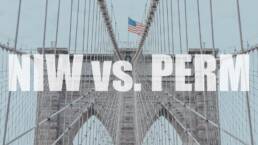If you’re considering applying for an employment-based green card, you may wonder what the differences are between the PERM labor certification process and the National Interest Waiver (NIW). The two processes are designed to meet different criteria. Generally, applying for either an EB-2 or EB-3 visa requires a specific job offer and a PERM labor certification process. However, a foreign national applying for an EB-2 visa may seek a waiver of a job offer or PERM process by establishing that their admission to permanent residence would be in the “national interest” of the United States.
The PERM Labor Certification
Program Electronic Review Management (PERM) is a labor certification process that employers must go through to successfully hire foreign workers to permanently move to and work in the United States under an EB-2 or EB-3 visa. It is a four-step process, which includes:
- formalizing the job description;
- making a prevailing wage request;
- placing advertisements and recruiting; and
- filing ETA Form 9089.
This process is overseen by the Employment and Training Administration (ETA) within the Department of Labor (DOL). As such, employers must submit PERM applications to the ETA prior to filing Form I-140, Immigration Petition for Alien Workers, to U.S. Citizenship and Immigration Services (USCIS). The PERM labor certification’s functional use is two-tiered. It verifies the following:
- there are insufficient available, qualified, and willing U.S. workers to fill the position being offered at the prevailing wage; and
- hiring a foreign worker will not adversely affect the wages and working conditions of similarly employed U.S. workers.
The following is a list of the pros and cons of the PERM labor certification:
Pros:
- It ensures that employers do not take advantage of the immigration system in order to bring cheap labor into the U.S. to displace qualified U.S. workers.
- It benefits foreign workers by ensuring that employers pay them a fair wage.
- It does not require the foreign worker to show that his or her work is in the national interest.
Cons:
- The foreign worker’s employer must petition on the foreign worker’s behalf.
- The PERM process can take up to six months, or as long as twelve months, depending on government processing times. Then, the immigrant petition approval process can take in between five to eight months. Lastly, the adjustment of status process will add additional time.
- An employer can be chosen for an audit. There are two kinds of audits that the DOL conducts: random and targeted. The random audits are unavoidable and unpredictable, but the targeted audits can be prevented.
The National Interest Waiver (NIW)
Specifically, for foreign nationals applying for an EB-2 visa, the NIW is a way to waive the job offer and PERM requirements. In order to use the NIW to bypass the PERM requirement, a foreign national will need to prove to USCIS that his or her endeavor in the United States is in the national interest and that waiving this requirement for the foreign national would also be in the national interest. The three factors USCIS considers for a NIW are whether:
- The foreign national’s proposed endeavor has both substantial merit and national importance;
- The foreign national is well positioned to advance the proposed endeavor; and
- It would be beneficial to the United States to waive the job offer and thus the permanent labor certification requirements.
The foreign national seeking national interest waiver may self-petition using Form I-140 and will need to submit evidence that proves these factors. The following is a list of the pros and cons of the NIW:
Pros:
- No labor certification is required.
- No job offer or permanent job position is required.
- Self-petition is allowed, meaning foreign nationals do not need their employer to petition for them on their behalf.
- The NIW process is typically completed in between five to seventeen months. Then, the adjustment of status process will add additional time.
Cons:
- The NIW is only available to EB-2 applicants.
- Showing that a foreign worker’s work is in the national interest of the U.S. is more subjective than the PERM determination. An immigration officer may deny a case because each case approval is up to the officer’s discretion, and not all officers adjudicate cases in the same way.
Conclusion
Generally, the NIW process is favored because it is quicker than the PERM process but remember that each case is individualized. Because each situation is unique when applying for an employment-based green card, it is best to discuss options with an immigration attorney.
If you have any questions about the PERM Labor Certification or the NIW, contact our office today to set up a consultation with one of our attorneys!
Ready to have Berardi on your side?
Whether you’re a business looking to hire or a professional hoping to relocate, immigration law can be complicated. But you don’t have to do it alone. Put our experience to work for you.



